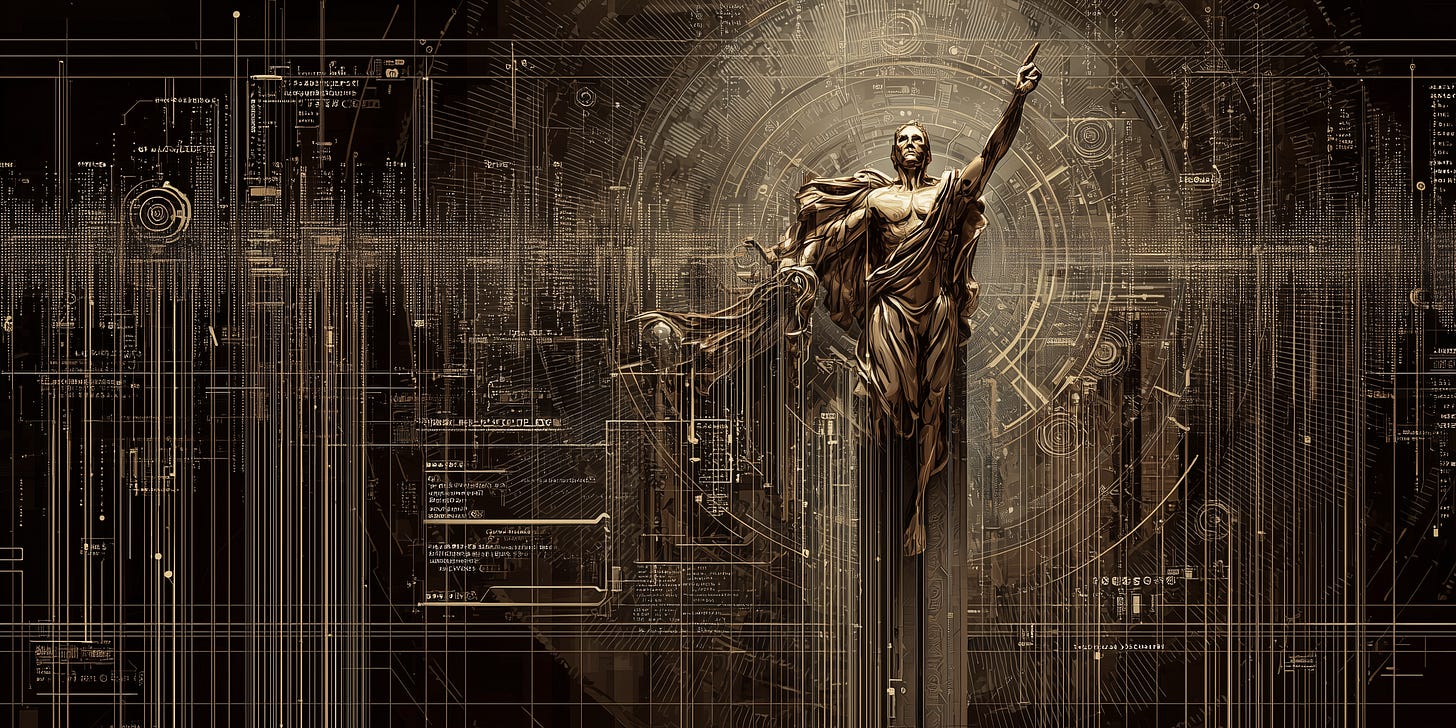Invisible Scaffolding: The Unseen Work Behind Political Humanism
Behind every public idea lies hidden scaffolding. Discover the meticulous foundational work supporting Political Humanism's approach to contemporary challenges.
Two weeks of silence in the Intelligence Frontier. In our hyperconnected world, absence speaks as loudly as presence—but what has this silence been building toward?
After the publication dated August 17th, my publishing schedule has undergone significant changes. Reports originally slated for immediate release were delayed until August 25th and 26th, accompanied by a blog post explaining our evolving publishing rhythm.
For those following either the Intelligence Frontier series or my broader work on Political Humanism, my apparent absence might have raised questions. But what appears as silence from the outside has actually been a period of intense immersion and focus behind the scenes.
The Deep Work Behind the Silence
During this publishing gap, I've been engaged in fundamental foundation-building work. The architectural underpinnings of Political Humanism have been undergoing extensive metamorphosis, requiring concentrated attention that simply couldn't be divided between deep structural work and public-facing content creation.
What I've been crafting isn't merely academic theory – it's canon development. This involves the meticulous process of weaving cross-coherence through eight interconnected Foundational Documentation that collectively form Political Humanism's backbone. This level of integration requires temporary isolation from the constant demands of regular publishing cycles. While developing foundations publicly alongside regular publishing might seem preferable, the interconnected nature of these concepts means that incomplete foundations would propagate inconsistencies throughout new content, ultimately requiring more extensive revision work.
The work has involved mapping conceptual relationships between domains, identifying points of theoretical tension, and resolving apparent contradictions to create a unified intellectual framework. Each conceptual node must support multiple connections while maintaining philosophical integrity across diverse applications.
This rigorous work transcends intellectual exercise and enters the realm of practical necessity. The Intelligence Frontier's analytical effectiveness depends on philosophical consistency—without it, we produce scattered insights rather than systematic analysis. Without this foundation, we produce mere fragments instead of a unified framework capable of consistent pattern recognition and strategic foresight.
AI Customization as Intellectual Infrastructure
At the heart of this foundation-building process has been the development of Prometheus: The Humanist Oracle—a sophisticated AI system meticulously trained on over 700 pages of Political Humanism documentation and expanding rapidly as the analytical framework undergoes systematic development. This endeavor represents far more than a technological experiment—it embodies the crystallization of philosophical principles into computational form. What emerges is a living, responsive embodiment of humanist thought capable of dialogue across domains.
To understand this challenge, picture an architectural blueprint spread across dozens of tables, with each segment containing intricate designs that must align perfectly with all others. Now imagine these blueprints are constantly evolving, with changes in one section necessitating adjustments throughout the entire structure. This is the challenge of maintaining philosophical coherence across Political Humanism's interconnected domains—a task that would require exceptional memory and pattern recognition if attempted through traditional means alone.
Prometheus serves as both archive and active participant in this process—preserving conceptual relationships while identifying tensions that might otherwise remain hidden. The system doesn't replace human judgment but rather extends it, functioning as intellectual infrastructure that allows for unprecedented cross-referencing, pattern identification, and theoretical stress-testing.
The challenge has been profound: ensuring that AI augmentation serves humanist principles rather than undermining them. This required developing a methodology where technology amplifies human agency rather than diminishing it. Such balance is rarely achieved in conventional AI applications. Every prompt architecture, every context summary, every analytical framework has been designed with meticulous attention to preserving the primacy of human judgment. The goal is leveraging computational power for synthesis and pattern recognition while maintaining human sovereignty.
What emerges isn't merely a tool but a philosophical companion—one that mirrors humanist principles back to us while helping navigate the labyrinthine complexity of interconnected ideas. This is the paradox at the heart of the project: using machine intelligence to strengthen human sovereignty rather than surrender to technological determinism.
This AI development work directly supports the broader challenge of achieving cross-domain coherence.
The Cross-Coherence Challenge
Political Humanism is documented across eight interconnected Foundational Documents that elaborate on key aspects of the framework:
The Human Lens: Scientific worldview through humanist eyes - exploring consciousness, biology, and evolutionary psychology as foundations for human-centered analysis
Reweaving the Social Fabric: Community, culture, and social structures - examining how meaningful connections form resilient societies capable of resisting fragmenting forces
The Abrahamic Matrix: Religious analysis and secular resistance - tracing theological influences on modern institutions and developing strategies for preserving secular governance
Marxism & Color Revolutions: Ideological capture and counter-strategies - mapping the evolution of revolutionary tactics and developing immunological responses to ideological subversion
Augmented Human: AI, technology, and human sovereignty - navigating the tension between technological amplification and maintaining genuine human agency
Mental Models: Conceptual frameworks and cognitive tools for analyzing complex systems and navigating uncertainty in rapidly changing environments
Political Humanism Meta-Narratives: Overarching explanatory frameworks that connect historical patterns with contemporary developments across multiple domains
Bitcoin Humanist State Theory (BHST): Theoretical foundations for sovereign governance systems built on decentralized monetary networks and humanist principles
These domains cannot exist as isolated intellectual silos.
The strength of the Political Humanism canon derives from its internal cross-referential integrity—the ability for insights from one domain to naturally illuminate challenges in another, creating reinforcing analytical connections rather than isolated theories.
This isn't merely philosophical alignment for its own sake, but operational coherence that enables real-world application across diverse contexts and challenges. When properly integrated, these domains create a holistic intellectual ecosystem where the analysis of religious movements informs our understanding of technological risks, where social fabric insights strengthen our resistance to ideological capture, and where the scientific understanding of human nature provides an ethical foundation for all other domains.
Consider how this integration works in practice: one persistent challenge we've encountered is the progressive Marxist bias embedded in AI training data—largely derived from the wider internet. This presents a complex cross-domain problem requiring integrated analysis. When examining this through the Marxism & Color Revolutions lens, we identify ideological capture patterns, while the Augmented Human framework reveals how these biases become encoded in technology. Meanwhile, The Human Lens provides the scientific meta-framework that grounds our analysis in empirical reality rather than ideological constructs, and the Mental Models domain equips us with the cognitive toolkit needed to detect conceptual drift where progressive frameworks overlap with the classical liberalism and libertarian perspectives that inform Political Humanism.
The issue extends beyond explicit language choices—it's about how even carefully calibrated language fails to produce desired analytical outcomes because these competing philosophical frameworks corrupt the interpretive lens. This demonstrates why we need a meta-framework—an overarching analytical structure constructed across multiple domains that can counter these systematic linguistic manipulations, which reflect systematic information curation and selective data representation across technological platforms.
This integrated documentation serves as the training data for the Intelligence Frontier Dispatches.
Why This Matters Now: The Strategic Imperative
I am not building another academic philosophy to gather dust on university shelves. Political Humanism represents analytical intelligence in its most vital form—an integrated framework meticulously designed for maintaining human sovereignty against the triple threats of religious authoritarianism, ideological capture, and technocratic control. The Intelligence Frontier dispatches serve as the operational translation of this framework, converting abstract principles into actionable analysis of current events and emerging patterns.
This work transcends theoretical interest; it addresses urgent civilizational challenges. As centralized control mechanisms accelerate their convergence across technological, financial, and ideological domains, the need for coherent resistance frameworks becomes increasingly critical. Without such frameworks, opposition remains fragmented, reactive, and ultimately ineffective against coordinated systemic capture.
But without deep coherence, even the most advanced analytical system inevitably breaks down. Individual insights, however brilliant, remain isolated data points rather than components of a unified understanding. Pattern recognition becomes superficial—identifying surface similarities without grasping structural connections. Strategic recommendations lose their grounding in principled analysis, devolving into tactical responses without strategic direction or philosophical foundation.
Where Things Stand Now: Progress and Path Forward
The foundation work continues with intensity and focus. I remain deeply immersed in developing the canon architecture that will eventually support more consistent content production. This involves not merely documenting isolated concepts but weaving interconnections that allow insights to flow naturally between domains—creating an analytical ecosystem rather than a collection of separate analyses.
While I had hoped to complete this architectural work sooner, the scope has proven significantly more extensive than initially anticipated. This timing wasn't arbitrary—the foundation work became critically necessary because the Intelligence Frontier analysis was beginning to strain against the limitations of an incomplete philosophical infrastructure. Attempting to maintain sophisticated pattern recognition across domains without properly integrated foundations would have inevitably led to analytical degradation—where pattern recognition becomes superficial and strategic recommendations lose their philosophical grounding—and conceptual drift, the gradual erosion of philosophical consistency as individual analyses begin contradicting the broader framework.
Each connection established reveals new areas requiring integration; each resolved contradiction unveils deeper patterns needing articulation. The process resembles archaeological excavation more than construction—carefully uncovering relationships that already exist rather than artificially imposing structure.
This publishing pause isn't permanent—it represents a strategic investment in deeper, more coherent analysis for the future. When publication resumes, the content will reflect this foundation work through increased analytical precision, more consistent pattern recognition across domains, and strategic recommendations grounded in unified understanding rather than isolated insights.
The Intelligence Frontier will ultimately benefit from this period of intense development, emerging with strengthened analytical capabilities and more robust resistance frameworks. What appears as absence from the outside actually represents concentrated presence behind the scenes—building capacity that will sustain long-term intellectual production rather than prioritizing short-term content creation at the expense of foundational coherence.
I extend my sincere gratitude for your patience during this extended gap and your continued interest as this critical foundation work progresses. Your engagement with this project makes the intensive development work worthwhile, and I recognize that consistent publishing creates expectations that this pause has disrupted. The philosophical architecture being developed now will support years of analysis to come, providing a coherent framework for navigating increasingly complex challenges to human sovereignty and agency.
What does this acceleration mean for you as readers? First, expect a stable Intelligence Frontier publication cadence that delivers consistent analysis you can rely on. Second, look forward to the gradual publication of the Political Humanism canon itself—a carefully paced unveiling of the framework underpinning Prometheus. As each component reaches sufficient maturity, it will be shared, giving you unprecedented insight into the analytical engine driving our observations. Finally, this foundation work will accelerate the conversion of complex canonical concepts into accessible teaching materials, making these powerful intellectual tools available to a wider audience.




